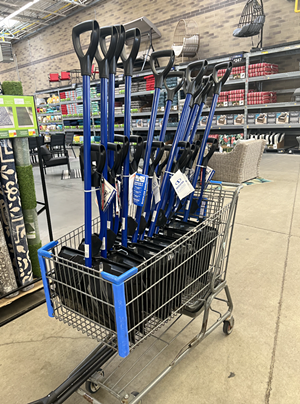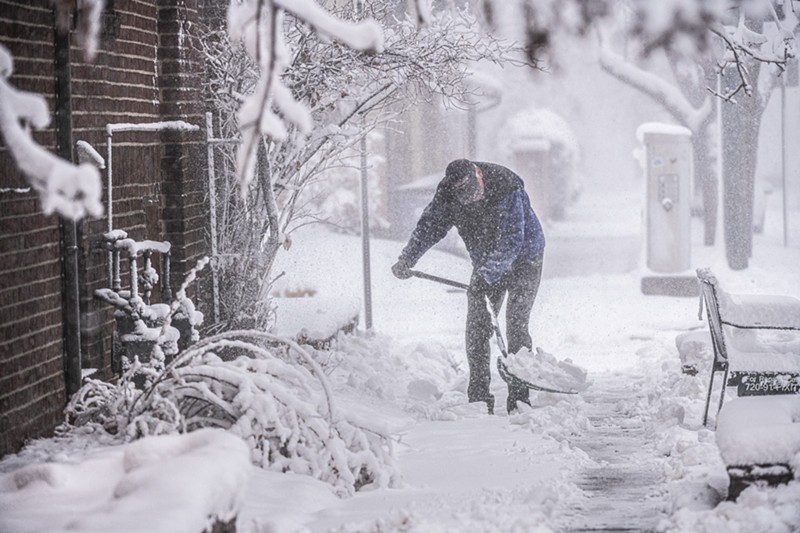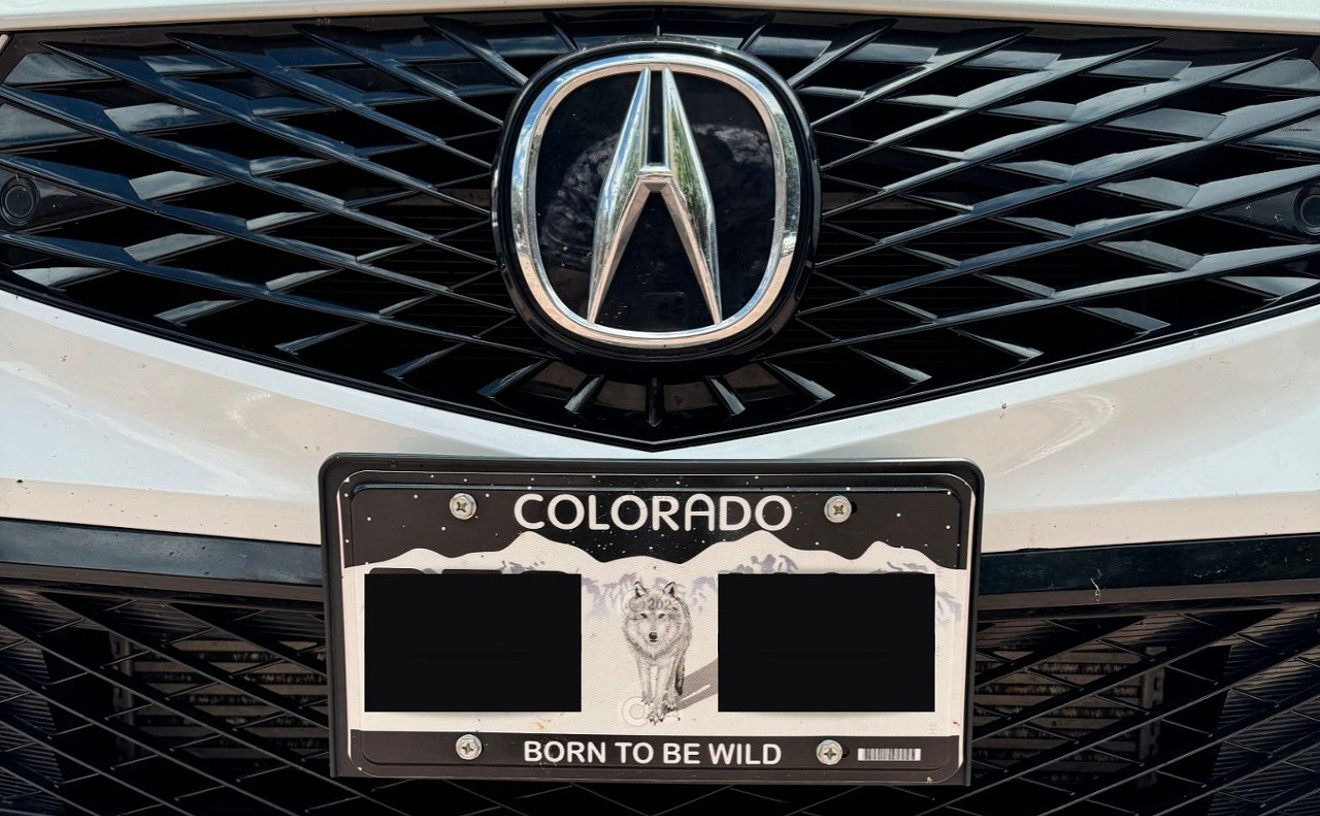"Everybody's just looking for work. They want to work," Filca says. "I'm just trying to get as many shovels into people's hands, and I think it also helps the community when there's a big snowfall. It's really hard. You have people who are elderly who can't shovel their own snow, and I know the migrants are very hardworking and eager to work. I figured this would be a good opportunity to mutually benefit them and our community."
Columbine Paper & Maintenance, a small supply store in Lakewood, donated the eleven snow shovels that Filca picked up this morning after hearing about her effort to collect them for migrants. Filca is hoping that she can find more shovel donors before the next big snowstorm, too. Before the donation from Columbine, she's had to give out snow shovels she bought herself for $10 at Walmart.
"Snow shoveling is something anybody can do," she says. "They can walk on foot, they can take public transportation. There have been thirty people reaching out to me on my Facebook inbox asking for a shovel, and I don't have them."
More than forty migrant families now have a shovel and will be able to clear driveways and sidewalks thanks to Filca, she says. The migrant families that received shovels are working close to where they're staying, mostly in City of Denver migrant shelters, near Tower Road, Interstate 70 and Federal Boulevard, off of 38th Avenue and Chambers Road and near Glencoe Street and the Cherry Creek area, Filca says.
"I'm really grateful, really, to Ms. Jasmina, the person here who's helping us," says Venezuelan migrant Charlie Segueri.
"We don't have jobs, so it'll help for a few days when the snow falls, and to get money to support ourselves."
Segueri made $100 on Thursday after five hours of work with the help of Filca's snow shovel, which he says "will help me buy food from day to day."
Filca started handing out the snow shovels during the week ahead of the snow fall, and she plans to keep giving out more. Her goal is to hand out more than 500 snow shovels to migrants before the snow season ends. "There's thousands, so I think 500 is a small number compared the number who'd love to get a snow shovel in their hands," she adds.
Undaunted by Thursday's snowfall, Filca plans on driving to Walmart before the day is over to see if she can get more snow shovels, but says they've been sold out since yesterday.
Women and single mothers have been eager to receive the shovels for work, too, say Filca, who is also handing out pairs of boots, gloves and hats as she obtains them. Filca has also been making signs in English for migrants advertising their shoveling services that read "Pay me what you feel is fair for my work. Thanks for your support."
Almost 40,000 migrants have arrived since December 2022
Largely from the tropical climate of Venezuela, many migrants in Denver arrive in flip-flops and a T-shirt, and some had never seen snow before they arrived in Denver. Raul Mendoza, who arrived from Venezuela in Denver in early February, says "the first snow I ever saw was on the peaks" of the Rocky Mountains in the distance.
As non-citizens, migrants can't work for taxable income unless they have work authorization. Venezuelan migrants who arrived in the U.S. before July 31 can get work authorization through Temporary Protected Status, a federal policy meant to protect immigrants from humanitarian crises in their own countries. Thousands of migrants have arrived in Denver since July 31, however, and they aren't eligible for work authorization this way.

Jasmina Filca began purchasing snow shovels at Walmart and collecting donations ahead of the March 14 storm.
Courtesy of Jasmina Filca
Another way to attain work authorization is to be granted asylum, or have had an asylum claim pending for 150 days. The last avenues for work authorization are to be paroled by immigration officials at the border or given permission to temporarily live and work in the U.S. while looking for a way to stay permanently. However, the City of Denver estimates that fewer than half of the more than 1,400 migrants sheltered in Denver right now are eligible for work in any way.
Paying a migrant to shovel a driveway won't get anyone in any legal hot water, says Jon Ewing, spokesperson for Denver Human Services. It's "no big deal," he explains. "If someone offers to shovel your sidewalk and you pay them as a gesture of goodwill, all good."
According to Filca, small jobs that might be chores for the average American teen could be the only livelihood available for migrants right now.
"When I was a kid, I shoveled snow and raked. It's not a job. It's just a transactional thing," Filca says. "Anything a teenager can do, teenagers don't need work papers, so we need to find jobs for them that a teenager can do."
Filca has been collecting backpacks and clothes for migrants at shelters and encampments since January. She gives her phone number out to migrants when she's handing off goods and is now in touch regularly with about forty migrant families who reach out to her to get what they need, she says, though at this point Filca admits she's "a little overwhelmed."
"I've been to every hotel shelter," she says. "After they transitioned out of the big hotels that were provided by the city, they've been in Motel 6's, so I've been going there." (The City of Denver is in the process of closing four of its migrant shelters, with two having closed already.)
Known as the "lady who helps people" by Segueri and other migrants, Filca says she's spent as much as $5,000 buying items like suitcases, shoes, snow shovels and protective equipment for construction work.
Filca, who moved to the United States from Romania at the age of five, considers herself a migrant. "I didn't speak a lick of English," she recalls. "It was very much a culture shock for me, so I understand what these people are going through, and I empathize."
Filca says that if people want to help her, they can Venmo money to buy more snow shovels or other items like clothes and boots. She also recommends sponsoring a migrant family, or committing to helping a particular family. The best way to reach her is on Facebook, she says.
"I know there's going to be more snow," she says. "We get a ton of snow in March — in April, even — so I'd love to get more shovels in people's hands."












